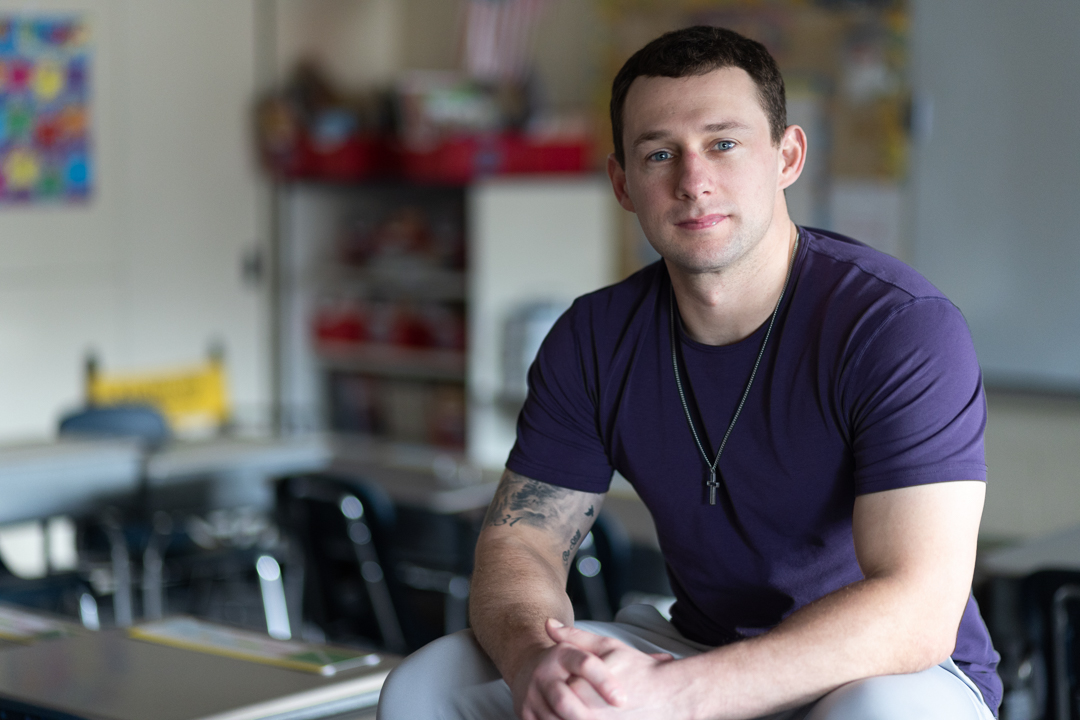My junior year of high school, the varsity team had to coach a youth basketball team. It was a couple of practices a week and a couple of games throughout the month in wintertime. I remember how fun it was on Saturday mornings, just being around the kids. I vividly remember how they looked at us. Seeing the kids happy to be there — seeing them learn how to shoot a layup, feeling that sense of gratitude — I thought of the coaches and teachers that I had grown up with, and I wanted to have the same impact on people that they had on me.
I get the same feeling when I come to school. The bulk of my fifth graders are just excited to see me. They want to talk to you in their downtime. They want to sit by you at lunch, and they want you to come to recess with them. That feeling is the driving force that made me become a teacher.
I remember panicking before I officially signed my first contract, not knowing if this is what I really wanted to do until I got in here as a teaching intern. As a college student, I hadn’t had a ton of opportunities to teach. I was in a classroom for only two or three weeks teaching a 30-minute ELA lesson, and after that experience, I was worried that I didn’t want to do this. But on my first day here as an intern, I remember walking in and 10 minutes later thinking, ‘I’m glad I stuck this out. Because this is definitely what I’m supposed to be doing.’
My whole life was always sports. Like, where’s the game? When’s the bus leave? What jersey do I need to grab? When’s practice? When can we go work out on our own? And then when that stopped, I remember sitting there going, ‘What do I do now? I got nothing. What are my hands supposed to do?’ And then getting into here, it’s now giving me my next step, my next purpose, now that sports are done.
I remember watching Coach K — who used to coach basketball at Duke University — talk about coaching and teaching being very similar in that you need to know how each player responds. There are players that you can holler at and get on their rear end and they respond well to it. There are players that you don’t have to say anything to — you just kind of look at them and your face goes, ‘You screwed that up, don’t do it again.’ And then there are players you have to sit next to on the bench, put your arm around, and console. It’s no different as far as teaching, especially with 10- and 11-year-olds.
There are kids that I know can take a firm tone and a look, and they get it. And there are kids where you just give them the look, and they understand what you’re talking about. And then there are kids that are a little more sensitive, and you need to pull them aside in private and sit down with them — and still be firm, but you need to be a little bit more sensitive to the fact that, you know, they might cry if you get on them in public, because maybe they get that at home.
I want my students to view me as somebody they can look up to, not just the talking head that teaches them math and science.
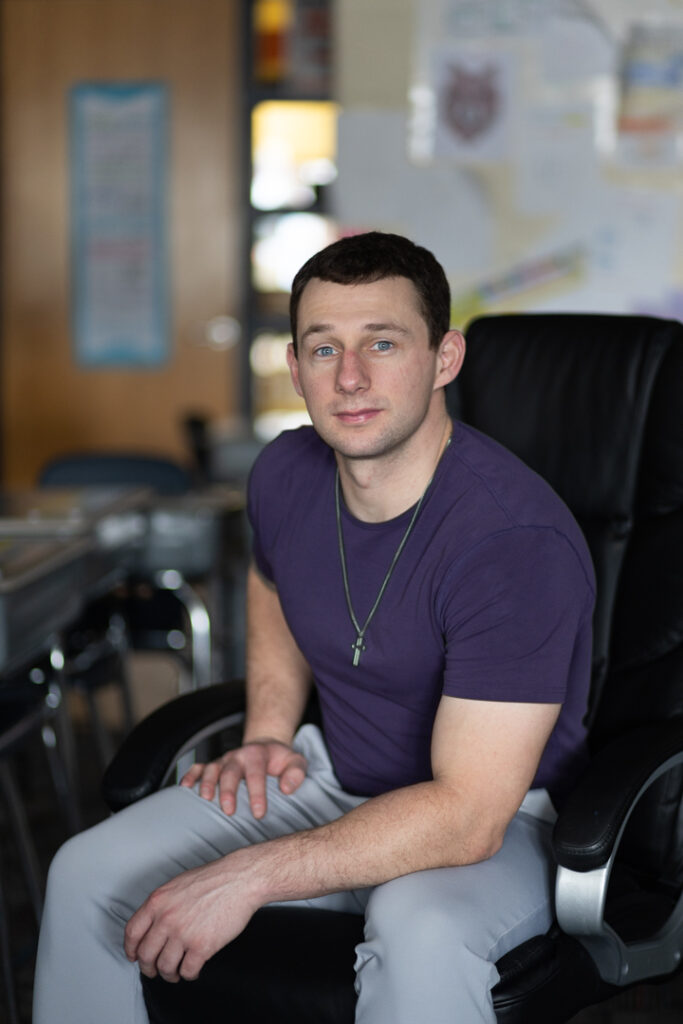
There are some kids that need a father figure, there are some kids that need a big brother figure, and there are some kids that need a coach-type adult in their life. They all need motivation, but in different ways.
I remember coaches from college and high school where I would eat up every word they said, and I appreciated how they handled me. I want my students to view me as somebody where if they’re having a bad day, they can trust me, they can come talk to me and shoot the breeze with me. I want it to be their home away from home. And if I can help the 52 kids in my two classes find enjoyment from being at school, then they’re going to be able to learn at a higher level.
I tell them, ‘I need you to define who you are, and I need you to focus on how to be a good person and how to treat people.’ Because at the end of the day, if we think back to our experiences in school, we remember the people who treated us poorly and we remember the adults and the classmates who treated us really well.
I want to try and motivate them to be better people in the world that we live in. And there’s a lot of bad things going on in the world that we see all the time. But if I can inspire 52 kids a year to be decent human beings, and then grow up and take that with them later in life, then I’ve done my job. If they can learn something academically on top of it, then that’s a bonus.
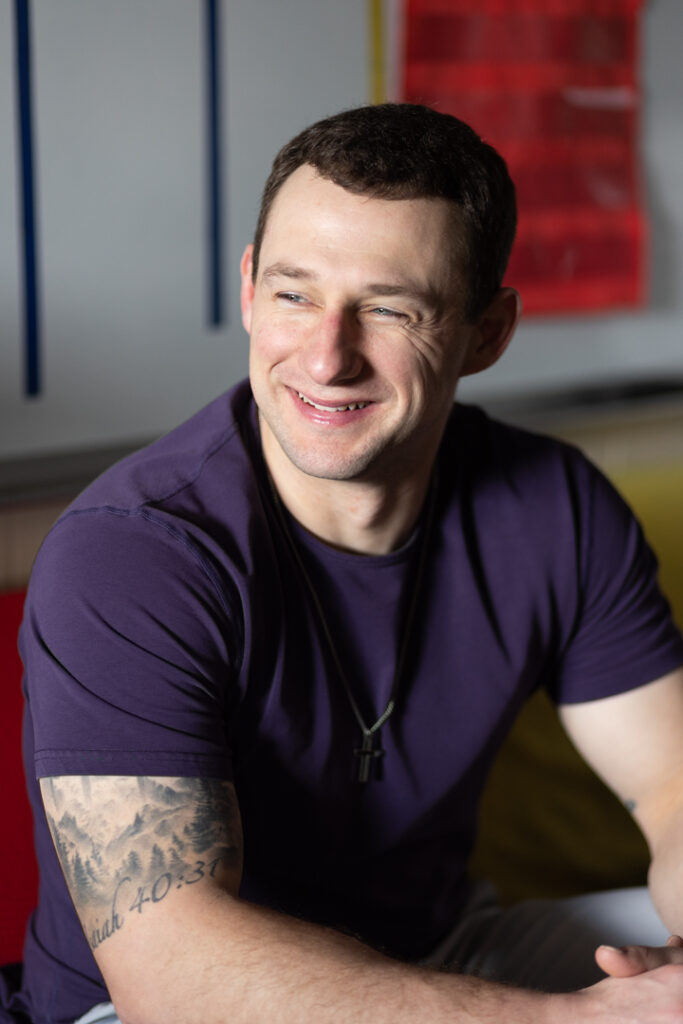
I think there’s a misconception of, ‘Oh, he’s just a cool, fun guy. They hang out with him, but what do they learn?’ But they’re a year away from middle school, and there’s a level of expectation that I hold for them.
I don’t try to micromanage everything. I think that’s one of the areas where teachers can fall short and wonder, ‘Why are certain students not following the expectations? Why does my room feel like chaos?’ I think that the more you try to micromanage kids, the more rules there are to break, and then you’re going to feel like they’re more off task than they are.
So I give the kids a sense of freedom. They’re allowed to work around the room, they’re allowed to work with partners — but if you’re screwing around, you’re going back to your seat. I guess it’s like any typical family: I want them to show me that they can handle certain freedoms, like going down the hall to get a drink without me having to follow them down. They get certain freedoms until they prove to me they can’t handle it.
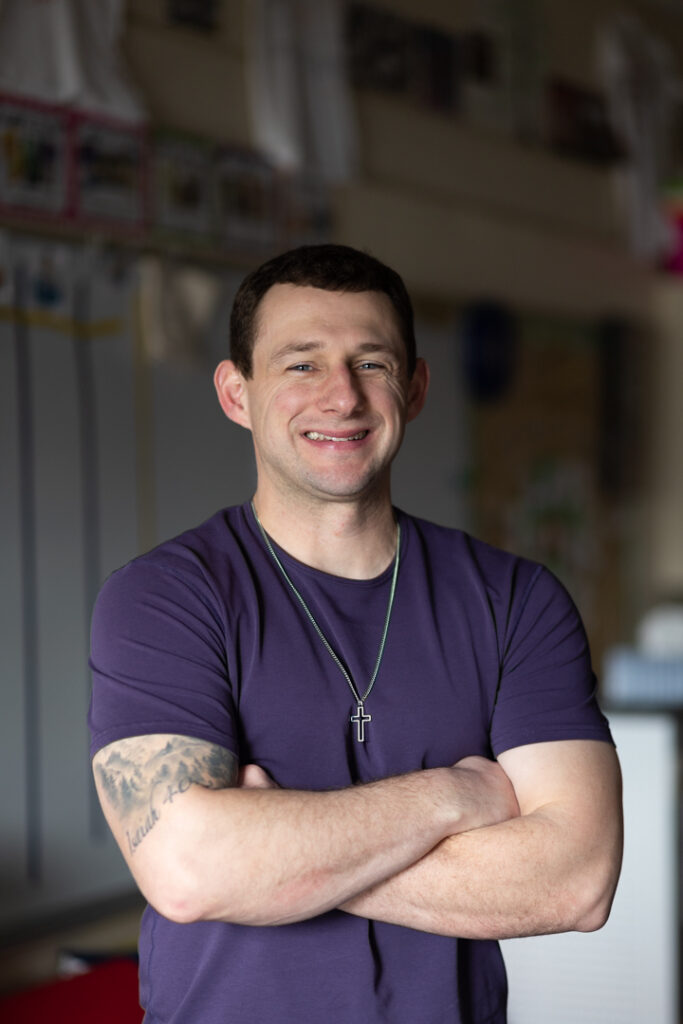
My philosophy is that between 8:25 and 3:45, when you’re here, we’re going to work as hard as we can. I know how hard I plan to make sure lessons are engaging and full of content and hitting what I need them to hit. But at the same time, if they’re gonna be here for seven hours, I want it to be fun. I want them to feel like they can be themselves.
As far as motivation strategies, I don’t have clip charts, I don’t do incentive programs, and I don’t do stickers. It’s natural consequences and natural praise. I tell the kids that I don’t get a bonus for coming to work early. There are some students that might need a little more public praise for getting in their seat on time or getting their stuff out a bit quicker. But for the most part, they’re moving towards the reality that there are certain things expected out of them, and that’s it. You don’t get a cookie, you don’t get a ribbon, it’s just expected out of you. And I’m trying to put that in their head while at the same time understanding they’re still kids. There are times when you need to give them a public recognition of ‘nice job.’ Positive reinforcement. ‘I see you. Thank you. Get back to work.’
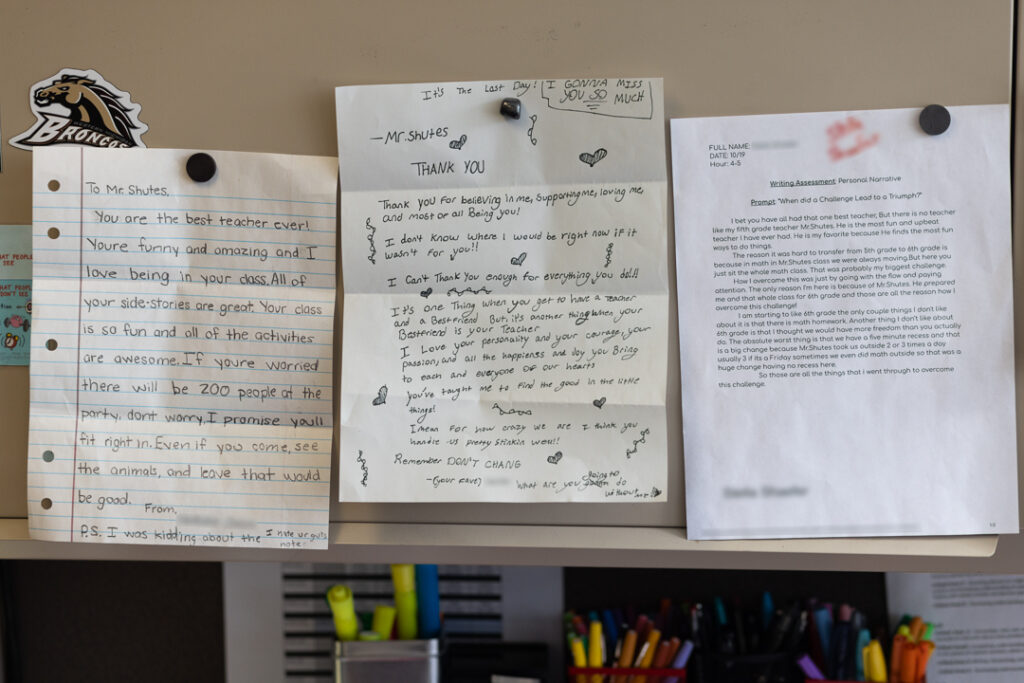

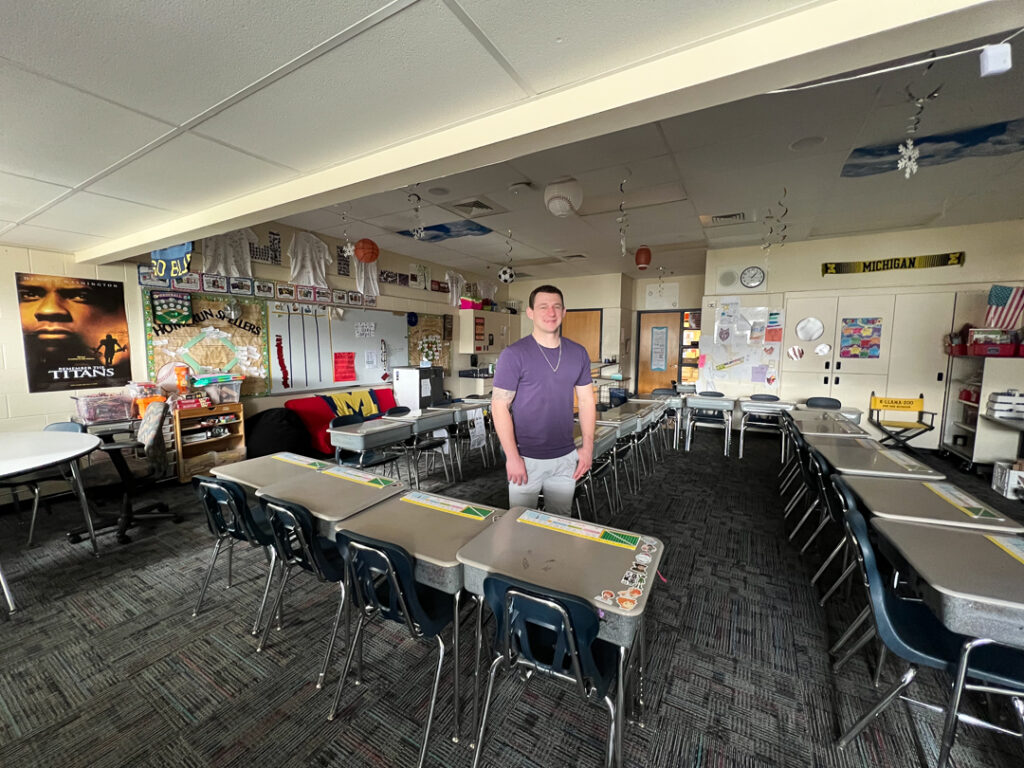
I’ve got a drawer full of letters and drawings and things that kids have given to me over the years. I had a student a few years ago who wrote an essay about me for her sixth grade ELA class. There are thank you notes in here from parents too. Things like, ‘Billy’s never enjoyed school until this year. You’ve given him a lot of confidence. We’re seeing a side of him at home that we’re not used to seeing.’ Hearing things like that lets me know that I’m in the right spot.
I think as humans, we’re always seeking that affirmation. You don’t necessarily need it to be put in lights or have fireworks wrapped around it, but just little tidbits. Especially as a teacher, because the job wears on you. There’s pressure on you. There’s noise from around the world, from social media, and there’s a lot of negative things out there about teaching. So when you get those positives, it helps you stay focused.
I gave a presentation to a group of college of ed students a couple years ago. I closed with a slide showing a jockey and his horse racing, and the horse has blinders on. And the whole point of the photo was that, as a teacher, you’ve got to keep the blinders on. Because if you go on to social media, a lot of it is really negative right now. And there are plenty of concerns and things that we all wish would change. We could be here for a long time talking about those things. But at the end of the day, I can’t get caught up in that. I can’t get caught up in everybody else’s negative opinions, because it’s going to distract me from the kids who are in front of me right now.
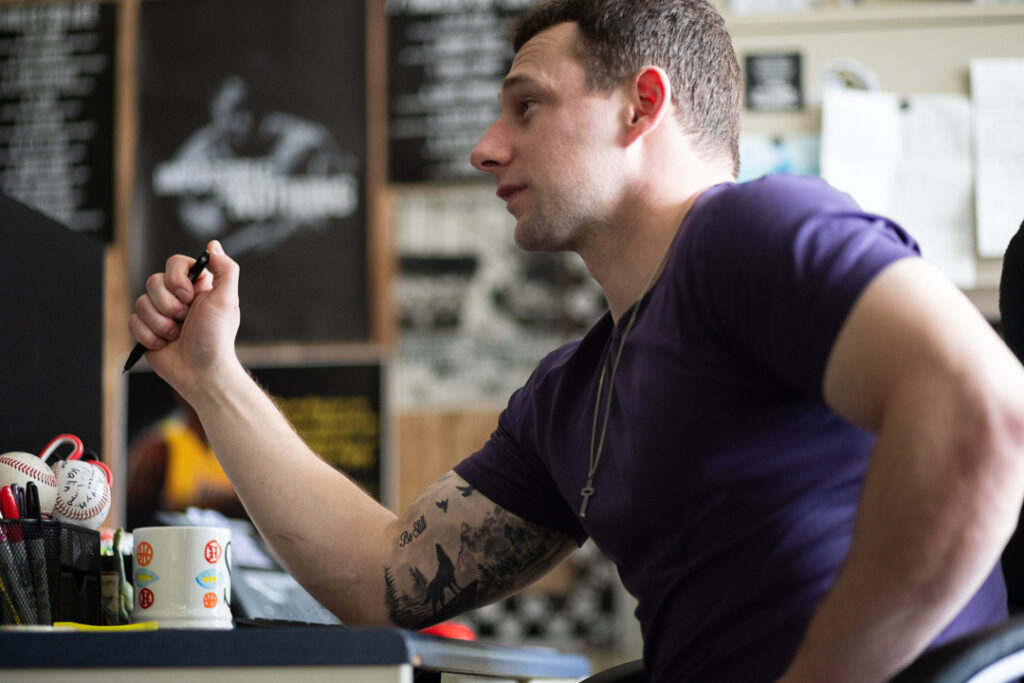
When people want to get into education and ask, ‘Hey, is this a career for me?’ I tell them, ‘If you’re passionate about it, without a shadow of a doubt, do it.’ Write your own story.
I mean, take for me, for instance. If I’d decided whether or not I wanted to be a teacher solely based on everybody’s opinions, I would have run for the hills. And I would have regretted it.
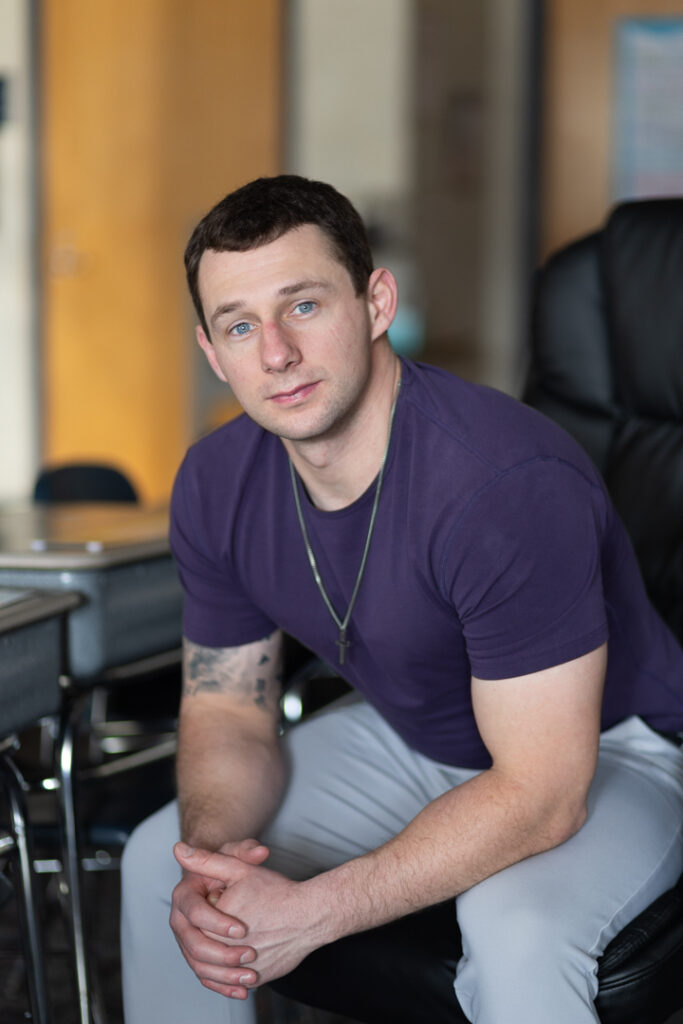
I’ve seen social media posts from these bigger educator accounts who have a lot of influence and a lot of eyes on their content. And, you know, if I didn’t know anything about this job and I scrolled through, I would think this was the worst job ever invented in mankind. And I hate that message.
I know where they’re coming from. I agree that there’s plenty that needs to change, and I hope it changes. But the number one thing that I hear from people is that administration has a huge impact. My principal has been here throughout my seven years as a teacher, and he was here before that too. He’s been nothing but supportive. He trusts my judgment, he trusts my colleagues’ judgment, and he doesn’t micromanage. I don’t feel like I’m talking to a CEO who sits on the top of the hill and looks down on everybody. So I think that’s why we don’t have much turnover here. We have a pretty great atmosphere. I think a lot of it has to do with the way he does his job as a principal. So shout out to you, Mr. Davison.
I always feel guilty talking about why I love teaching and why I’m still here — why I feel like I’m going to be doing this for the rest of my life, because the experience has been so positive. I feel guilty gassing up this job when I know the reality is different in other places, but I can only speak to my experience.
I’ll get the ‘toxic positivity’ comment every now and again: ‘You’re gaslighting, you’re full of it, you’re just doing this for social media.’ No. Genuinely, for seven years, this has been the best thing that’s happened to me.
I made a video telling the story of how a student of mine came in and the soles of his shoes were coming off — he was dragging his feet just to keep them together. He looked like he had been through a war. He probably hadn’t slept much the night before, knowing what his home background was like. And I felt horrible for the kid and I pulled him aside, and he said those were the only shoes he had at that moment.
I sent him down to our social worker who runs a closet with extra clothes and supplies. And he came back with a brand new pair of bright orange shoes, and his whole day flipped around. I’ve never seen someone go straight from ‘I want to fight somebody’ to ‘I’m good, let’s go, let’s have school.’
That same student was taking snacks and bag lunches home so his brothers could eat.
There are kids who are really struggling with their mental health. When I was a kid growing up, I don’t remember classmates talking about not wanting to be here anymore. I don’t remember classmates talking about wanting to hurt themselves. But as a teacher, I see that all the time.
When that happens with a particular student, their academics don’t mean anything right then, because what’s going on between their ears isn’t good. Maybe what they go home to is not a good experience. Some kids don’t need you as an academic. They need you as somebody that could potentially save their life and talk them into sticking around — help them find their passion.
It’s not just long division. It’s way deeper than that. And I think it’s always been that way. But you don’t really understand it until you get in here and you experience it every day.

I had a student who struggled with his confidence and who he was. He had some things to work on as far as social skills, to allow people to want to be around him a little bit more. There was always some point during the day where he was gonna have a moment where he felt left out and felt like people were running away from him. Every single day, I knew there was going to be a moment where this particular student and I were going to sit down in the hallway or in the coat room or at the back table, and we were going to go over what was on his mind. I would share things he could do to make people more willing to sit next to him at lunch or want to work with him during partner time. And, you know, it always ended with him smiling.
He was a very likable, smiley kid that had a great sense of humor. He just had trouble relating to kids sometimes and didn’t know how to approach classmates. We worked on that the whole year. And now that he’s gone to middle school, he’s come in a few times to visit. He’s excited because he’s in the band and he’s got an instrument. And that was all I wanted for him going into middle school: to find something he was excited about, because there were many days when he didn’t want to be here. And now that he’s found his thing with band, and I’ve heard that he’s doing well, that’s been a very gratifying story to keep up with.
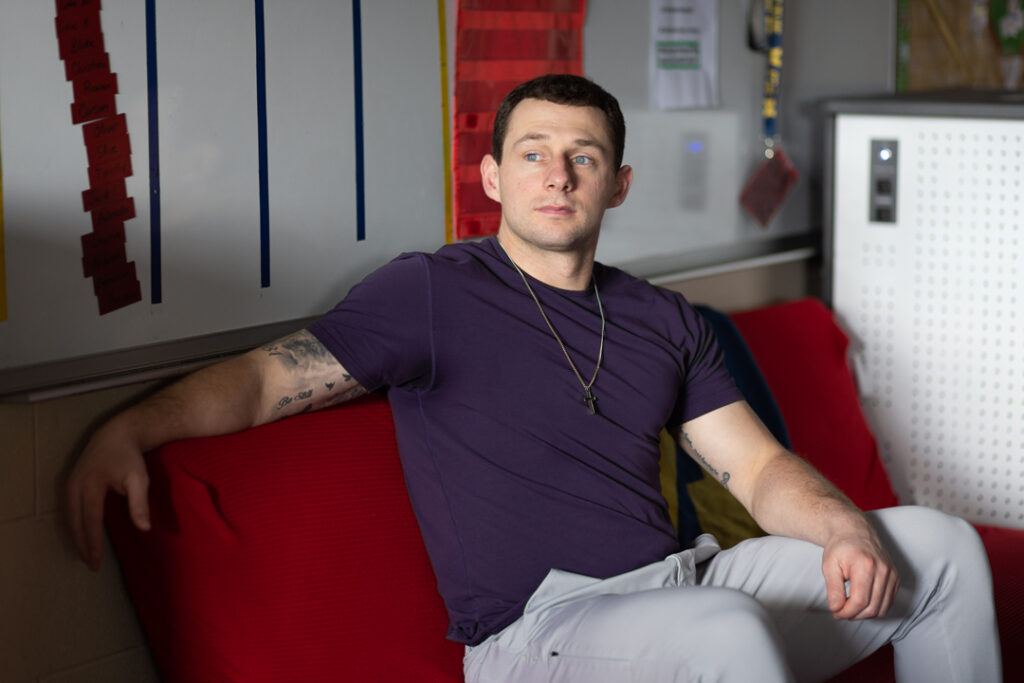
I want kids to understand that if you’re going to be here anyway, it helps to look for the thing you’re passionate about. You don’t need to ignore your mental health or pretend you’re not affected by what’s happening at home. But I would go out on a limb and say that most if not all students can find something at school that they enjoy. Not saying it’s academic, but it could be a friend they know they’re gonna see everyday, could be a teacher they can confide in, could be a class they’re gonna have. It could simply be the time in the cafeteria with their friends.
Even if you have difficulties, there are people you can go to. I don’t want the kids to make a habit of making excuses like, ‘I’m having a bad day, so I just don’t feel like doing my work.’ Because one day, you’re an adult, and there are expectations of you as an employee, but also as a parent or as a husband or as a wife, or as a friend or as a brother.
There’s no way I could have dealt with some of the things that I know these kids are going through. So teaching them coping mechanisms, teaching them how to confide in an adult, whether it’s myself, one of our counselors, another teacher, or an adult at home — learning to get it off their chest but still operate as a human being is important. Learning not to let the pain derail them completely.
I want to raise sensitive kids who pay attention to those around them. And I also don’t want them to be excuse makers. That’s what it comes down to.
–Dan Shutes
Teacher at Paw Paw Later Elementary School
Paw Paw, Michigan
Share a link to this story
…or see Dan’s posts on:
Wondering how you can support Dan and his students? There’s an Amazon wishlist for his classroom here, and Dan posts updates to his TikTok and Instagram.
